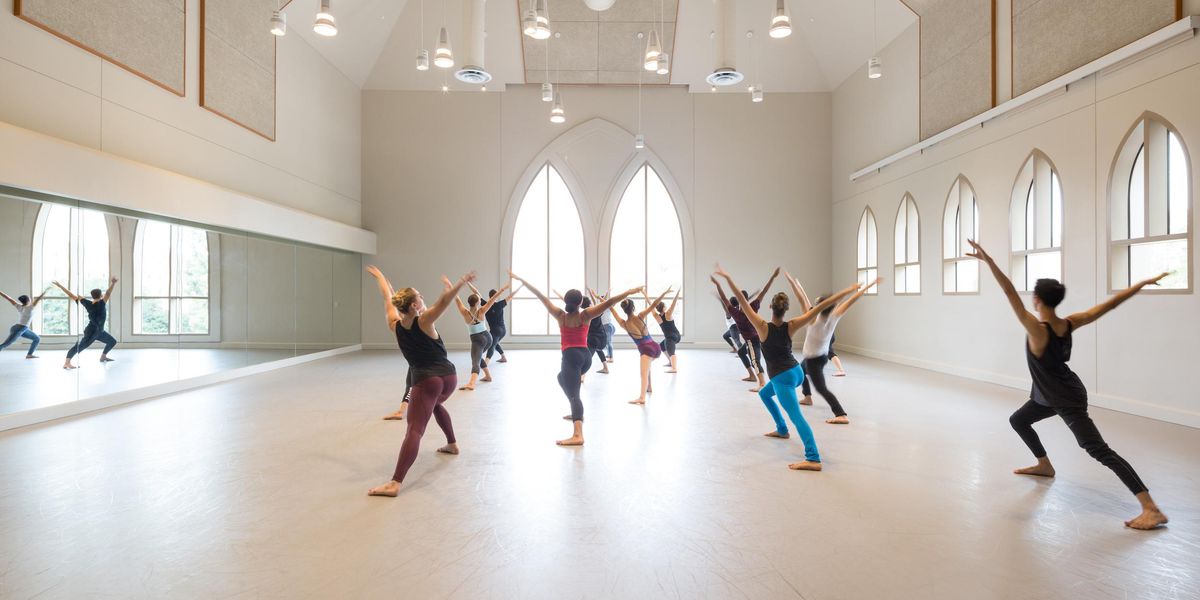On Their Terms
Princeton University Ballet
members in performance. PC Noel Valero, Courtesy PUB
Student-run companies allow dancers to take charge of their college experience.
The purpose of student-led companies may seem obvious: to give college dancers the opportunity to perform with one another, and, in many cases, the chance to choreograph. But they also provide students with a community unbounded by the classroom, help them to develop leadership skills and allow them the flexibility to pursue dance on their own terms. “Student-run companies can be what you make of them,” says Alison Marsh, of Smith College’s Celebrations Dance Company. “You can be in 10 dances, or you can be in two.” For Emily Avery, of Princeton University Ballet, running a company brings “a bigger sense of pride in what we do. Everything that we put on the stage is the product of a lot of hard work.”—Lauren Wingenroth
Double Duty
Colleges with strong dance programs already offer packed dance schedules. So why do some dance majors also choose to participate in student-run companies? Alison Marsh, who’s double-majoring in dance and biology at Smith College and is the artistic director of Celebrations Dance Company (where half the company members are also majors), weighs in:
- Student-run companies remove the pressure of grades and give students the freedom to experiment.
- Choreographers aren’t limited by the stylistic requirements or expectations of the dance department faculty.
- First-years unsure if majoring is right for them get a chance to talk to older students about their options and get a taste of the campus dance scene.
- Students gain leadership and production skills by serving on board positions and participating in behind-the-scenes projects.
Members of BOSS Dance Company. Brynn Yeager, Courtesy BOSS
A Company with a Mission
After the University of Tennessee’s dance department folded in 2009 due to budget cuts, the final class of majors founded BOSS Dance Company. Now the largest dance organization on campus, BOSS provides students with a place not only to perform, but to take weekly technique classes taught by local professionals—the only ones offered anywhere at UT. But the group has an even bigger mission—to prove to the administration that the dance department should be reinstated. Until then, “people are more invested in the company because they don’t have the dance program to fall back on,” says BOSS secretary Dante Carrillo, a business finance major.
Ballet at the Ivies
At three Ivy League schools, students take time from their academically focused lives to participate in selective student-run ballet companies. Columbia Ballet Collaborative, Princeton University Ballet and Harvard Ballet Company each perform work by exciting contemporary ballet choreographers (like Trey McIntyre, Emery LeCrone and Norbert De La Cruz III) as well as excerpts from full-length classical works. Neither Harvard nor Princeton have dance majors—Columbia students can major through the affiliated Barnard College program. The Ivy Ballet Exchange, founded in 2014, brings the three together biannually for performances, workshops and showings. “It’s such a supportive community, which is unusual in the ballet world,” says Princeton University Ballet president Emily Avery. “Everyone really understands what each other is going through as they try to balance education and keeping up with ballet.”
By Students, For Students
Groups of note throughout the country—each representing different models of what a student-run company can be.
Art House Dance Company, University of Pennsylvania
Holds weekly technique classes taught by Philadelphia-area professionals, and collaborates with an a cappella group for one of its two yearly performances.
Gamut Dance Company, Davidson College
Students choreograph work with the help of professional mentors and Davidson faculty members.
Harvard-Radcliffe Modern Dance Company, Harvard College
Encourages improvisation and process-oriented work from student choreographers, and commissions guest artists like David Leventhal and Elizabeth Weil Bergmann to set and create pieces and teach classes.
Repertory Dance Company, Washington & Lee University
Run by students with support from the dance department, which helps commission guest artists.
Wellesley College Dancers, Wellesley College
Performs alternative versions of The Nutcracker each winter and brings in one guest choreographer per semester to create a company piece in addition to student-choreographed works.




